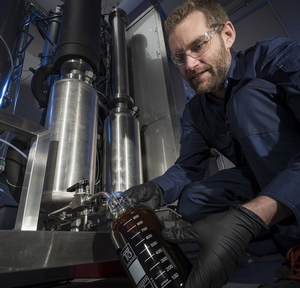Energy Security
IO4: Energy security
Impact KPI-7 Bioenergy and liquid biofuels
By 2019 Scion will have identified the key barriers towards more widespread use of biomass for heat and the production of transport fuels and proposed solutions.| Leading indicator | Progress |
| By 2016 Scion will have developed an interim biofuels roadmap for consultation and stakeholder engagement. | The qualitative roadmap was not achieved due to delays acquiring a licence for an Energy Technologies Institute (UK) model. The model is now installed at Scion with stakeholder interviews underway. |
| By 2017 Scion will have assisted one company to re-evaluate its strategy towards bioenergy/biofuels implementation, and will have provided technical support towards the development of a commercial project. | As part of the industrial symbiosis project, a feasibility study of wood fuel use in central North Island dairy processing was completed. |
| By 2017 Scion will have supported one biomass side stream-to-bioenergy commercial opportunity in New Zealand. | Technical support was provided for product improvement/development of two different types of solid biofuels with the companies involved. |
| By 2018 Scion will have supported a group of firms in one region to develop a value proposition, based on industrial symbiosis using wood energy, outlining the benefits/risks across economic, social and environmental criteria, enabling them to make an informed decision for action. | The industrial symbiosis project identified opportunities for locating waste resource processing or new primary processing plants in the existing Kawerau cluster of pulp and paper and wood processing operations. Further work is needed on the economics and benefits of locating these new opportunities at Kawerau vs a greenfield site. |
| By 2019 Scion will have identified, and reached national alignment, around the Implementation Roadmap for Biofuels in New Zealand. Technology barriers, acceleration options and policy interventions will be identified. | The Biofuels Roadmap development process has generated a lot of interest with six companies and five government departments and agencies contributing to the project. |
| By 2020 Scion and commercial partner(s) will have developed a viable and New Zealand specific biorefinery business case based on Scion’s high-value bioproducts and commodity (fibres and bioenergy) platforms. | In progress. A New Zealand-relevant biorefinery concept is currently in development. |
From wood, to fuel
 Scion has been involved in bioenergy and biofuels research for many years. The focus of this research currently centres on developing the technologies to convert softwood into liquid biofuels and other chemicals.
Scion has been involved in bioenergy and biofuels research for many years. The focus of this research currently centres on developing the technologies to convert softwood into liquid biofuels and other chemicals.
New Zealand’s transport sector alone is 99 per cent dependent on fossil fuels, and responsible for 17 per cent of the country’s carbon dioxide emissions. Most of the oil used to produce these transport fuels is imported, making it the country’s biggest import.
Replacing just some of this imported oil with locally produced biofuels would significantly improve our balance of trade and reduce our reliance on fossil fuels. It will also generate numerous business and employment opportunities, boosting regional growth as well as lowering greenhouse gas emissions and delivering on our commitment to the Paris Climate Change Agreement.
This year Scion started using a newly acquired fast pyrolysis plant to convert wood into bio-oils, which can then be further refined into transport fuels or bio-chemicals.
The fast pyrolysis plant has been designed and built by the University of Twente in the Netherlands, a recognised leader in pyrolysis research and development since the 1970s. The plant is capable of converting 1 kg of wood at a time into about 750 mls of raw pyrolysis oil each hour, using sand as the thermal conductor. By rapidly heating small wood particles to approximately 5000C in the absence of oxygen, the pyrolysis reactor creates vapours that are then quenched, producing the oil. The whole reaction and quenching takes place in seconds.
The plant is an essential part of Scion’s research programme. It is specially designed to obtain accurate and reproducible results that will provide comprehensive information on the performance of New Zealand specific feedstocks in this type of process.
“We are focusing on developing our capability in thermochemical conversion technologies such as pyrolysis to convert wood directly to bio-oils,” says Research Leader Dr Ian Suckling. “These oils can then be upgraded to drop-in fuels that can be blended directly with fossil fuels.
“There is a lot of variation in wood and how it could be pre-treated before being put into fast pyrolysis. Each treatment might result in different qualities of bio-oil, which in turn, may affect its suitability for conversion into fuels.
“We’ve developed a range of analytical methods to characterise the experimental bio-oils we produce, and are currently using the plant to trial various temperature settings, feedstocks and pre-treatments to identify the best combination for fuels.”
Ian says that while the pyrolysis of wood to oil is already at a commercial stage internationally for industrial energy and heating use, Scion’s research focuses on converting it to fuel and generating New Zealand specific solutions. The research is already attracting interest from industry, government and Māori groups.
Ian and the research team have been applying this capability in a joint programme with the Korea Institute of Energy Research (KIER) for the past three years, to complete techno-economic and thermodynamic performance analyses of their pyrolysis plant. Ian recently presented the findings to KIER’s funding agency along with submissions to fund further collaboration in bio-oil production and refinement.
Scion scientist Dr Ferran de Miguel Mercader has also joined the International Energy Agency’s Task 34 (Direct Thermochemical Liquefaction) as New Zealand representative. The IEA works to ensure reliable, affordable and clean energy for its 29 member countries and others.
